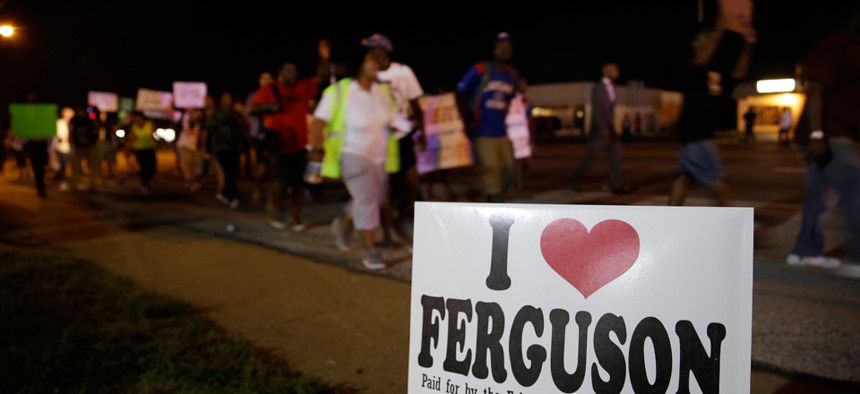But maintaining and repairing Ferguson's national image should not be the focus now. Hogan said that trying to protect the city's reputation in the immediate aftermath of a tragedy like the shooting in Aurora, or the shooting and protests in Ferguson, is "not only inappropriate, it's wrong."
"The victims and their families, they don't care about the reputation of the city. The first responders who had to take care of whatever happened, they don't care about the reputation of the city," he said. "You have to lead with your heart and your soul and your feelings, but do it in a strong, direct, in-control way. Then over time, you can start to address the psyche of the community."
That process takes much longer. It's been 23 years since officers in Los Angeles beat Rodney King nearly to death. Hogan said that he expected it would be 10 or 15 years before he could truly say that Aurora had "come back" from the shooting. "I mean, people still talk about Columbine and that was 15 years ago," he said.
"Aurora is always going to be mentioned in the context of someone else's tragedy," Hogan said. "But if we do our jobs right over those 10 or 15 years, first of all, there will be plenty of opportunities to have Aurora be identified in a different way, in a positive way over that time."
They're making progress, a little bit at a time, and that's all that matters to Hogan. "Certainly, for the families of those who died, it's never going to get better," he said. But more and more he sees his city coming back. Some 20,000 people have moved to the city in the last two years, and more and more people are going to see movies at the same Century 16 Megaplex where a dozen people lost their lives. Now, even the families of those who were killed participate more in community activities, Hogan said.
Like Ferguson, Aurora is still going through the legal process. Movie theater shooter James Holmes is scheduled to go to trial at the end of this year, and in Ferguson, a grand jury is expected to hear evidence surrounding Michael Brown's killing through late fall. More legal battles could be on the horizon for Ferguson. That kind of a lengthy process "results in front-page headlines at times," Hogan says.
But even that gets easier over time. "There aren't as many reactions to those headlines as there were in the first year. And by 'reactions' I mean people calling for mental-health services," Hogan says. Aurora opened up what they're calling the Resilience Center in the aftermath of the tragedy, offering free counseling and an open space for all kinds of activities, open 24 hours a day.
Los Angeles had a very different path to restoration. More than a year after King was beaten, the officers responsible were acquitted, leading to riots and looting all over the city. Sixty-three people were killed and thousands were injured before the unrest settled down.
Unfortunately, Riordan says, it took another tragedy for Los Angeles to truly begin to heal. The Northridge earthquake in January, 1994—just a year and a half after King's beating kicked off the L.A. riots—tore the city apart in a more literal sense. The devastation, Riordan says, really brought the city together. "I instructed the people of L.A.: help your neighbor, help yourself, do not worry about city laws or regulations or anything, just get things done," Riordan says.
But there were still deep wounds in Los Angeles, some that still exist today. Riordan, who took office a year after the riots, says that he was instrumental in ousting then-chief of police Willie Williams, the first African-American to hold that position. Williams had failed to come through on promises to revamp the force in the aftermath of the King beating.
And Riordan, who is white, continued his outreach to the African-American community. "When I came into office the first day, a bunch of the African-American leaders asked to meet with me, which I did. I remember holding hands in a circle with them and saying prayers," he said.
"That helped. But nothing was magical on its own," Riordan added.
Ferguson is going to need time to come back. By maintaining an open dialogue within the community, offering leadership and creating the space and services for its citizens to heal, officials can begin to restore the city. But that's not going to happen overnight.
Hogan gave the same advice to Ferguson that he gives his own citizens. "We cannot forget and we cannot ignore what happened," Hogan said. "But we do not have to be obsessed by it and we do have to move on."




